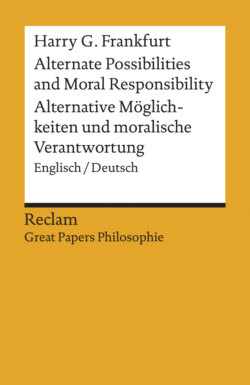Читать книгу Alternate Possibilities and Moral Responsibility / Alternative Möglichkeiten … - Harry G. Frankfurt - Страница 8
На сайте Литреса книга снята с продажи.
III
ОглавлениеThe case of Jones3 may appear at first glance to combine coercion and moral responsibility, and thus to provide a counterexample to the doctrine that coercion excuses. It is not really so certain that it does so, however, because it is unclear whether the example constitutes a genuine instance of coercion. Can we say of Jones3 that he was coerced to do something, when he had already decided on his own [20]to do it and when he did it entirely on the basis of that decision? Or would it be more correct to say that Jones3 was not coerced to do what he did, even though he himself recognized that there was an irresistible force at work in virtue of which he had to do it? My own linguistic intuitions lead me toward the second alternative, but they are somewhat equivocal. Perhaps we can say either of these things, or perhaps we must add a qualifying explanation to whichever of them we say.
This murkiness, however, does not interfere with our drawing an important moral from an examination of the example. Suppose we decide to say that Jones3 was not coerced. Our basis for saying this will clearly be that it is incorrect to regard a man as being coerced to do something unless he does it because of the coercive force exerted against him. The fact that an irresistible threat is made will not, then, entail that the person who receives it is coerced to do what he does. It will also be necessary that the threat is what actually accounts for his doing it. On the other hand, suppose we decide to say that Jones3 was coerced. Then we will be bound to admit that being coerced does not exclude being morally responsible. And we will also surely be led to the view that coercion affects the judgment of a person’s moral responsibility only when the person acts as he does because he is coerced to do so – i.e., when the fact that he is coerced is what accounts for his action.
Whichever we decide to say, then, we will recognize that [22]the doctrine that coercion excludes moral responsibility is not a particularized version of the principle of alternate possibilities. Situations in [834] which a person who does something cannot do otherwise because he is subject to coercive power are either not instances of coercion at all, or they are situations in which the person may still be morally responsible for what he does if it is not because of the coercion that he does it. When we excuse a person who has been coerced, we do not excuse him because he was unable to do otherwise. Even though a person is subject to a coercive force that precludes his performing any action but one, he may nonetheless bear full moral responsibility for performing that action.
